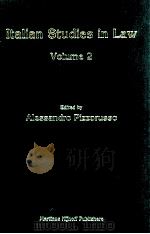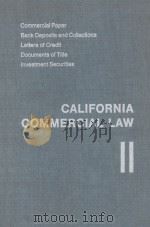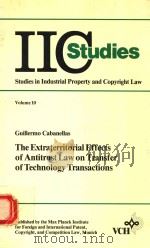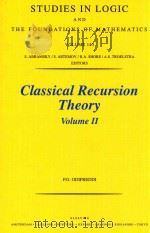《ITALIAN STUDIES IN LAW VOLUME II》
| 作者 | GENERAL EDITOR:ALESSANDRO PIZZ 编者 |
|---|---|
| 出版 | MAPTINUS NIJHOFF PUBLISHERS |
| 参考页数 | 239 |
| 出版时间 | 1994(求助前请核对) 目录预览 |
| ISBN号 | 0792324838 — 求助条款 |
| PDF编号 | 813695718(仅供预览,未存储实际文件) |
| 求助格式 | 扫描PDF(若分多册发行,每次仅能受理1册) |

Articles3
Legal Absolutism and Private Law in the XIX CenturyPaolo Grossi3
1. The Positive and Negative Sides of Codification3
2. The Lawyer from Interpreter to Exegetist6
3. Reaction to Legal Absolutism in Italy12
Costantino Mortati: A Founding Father of Italian DemocracyGustavo Zagrebelsky17
1. Questions of Method17
2. Approaching Mortati19
3. Constitutional Evolution22
4. Towards Social Democracy26
5. The Concept of Law29
6. Intermediate Bodies in the Social State32
7. a) The Person32
8. b) Intermediate Communities37
9. c) The State42
10. Conclusions on the Method47
Law and the New Frontiers of Human LifeFrancesco D. Busnelli53
1. Analysis of the Topic53
2. The Myth of Legal Imperialism54
3. The Collapse of the Myth58
4. The Exaltation of Modern Individualism59
5. The Problem of Incompetent Patient63
6. The Abortion Revolution in the U.S.A.65
7. European Trends68
8. Constitutional Courts Decisions71
9. The Illusion of Compromise73
10. "Reinstate the Aims of Life in Law and Law in the Aims of Life"76
Codes and Constitutions in Civil LawAntonio Gambaro79
1. Foreword79
2. The Historical Development of the Idea82
3. Property Rights as the Core of the System86
4. The Legal Protection of Property Rights90
5. Civil Codes and Their "Weak" Political Meaning97
6. Constitutions and Their "Strong" Political Meaning99
Administrative Transparency and Law Reform in ItalyGregorio Arena105
1. Foreword105
2. The Concept of Administrative Transparency106
3. A New Legitimacy for Administration112
4. Freedom of Information after Law no. 241 of August 7, 1990117
5. Subjective Profiles of the Right of Access to Administrative Documents119
6. The Object of the Right of Access125
7. The Interests Protected through Limitations of Access128
8. The Deferment of the Right of Access132
9. Procedures for the Application of Exemptions135
10. Analysis of the Exemptions139
Appendix: Law no. 241 of August 7, 1990 (excerpts)142
The New Italian Code for Criminal Procedure. A Concise OverviewVittorio Grevi145
1. Origins and Aims of the Reform Carried Out by the New Code145
2. Returning the Public Prosecutor to His Role-as-a-Party147
3. From the "Investigation Judge" (Giudice Istruttore) to the "Judge for the Preliminary Investigations" Giudice per le Indagini Preliminari)150
4. The Taking of Evidence152
5. The Preliminary Inquiries156
6. The Preliminary Hearing161
7. The Immediate Judgment, the Shortened Judgment and the Enforcement of the Sentence at the Request of the Parties164
8. The Outcome of the Proceedings Made in the Preliminary Phase and the Content of the Trial File166
9. The Hearing of the Trial169
10. Final Remarks174
Culpability and Ignorantia Legis in the Italian Legal System: A Dual Concept in EvolutionFrancesco C. Palazzo179
1. Foreword179
2. Ignorantia Legis and the Laws180
2.1. Ignorantia Legis in the Penal Code180
2.2. Ignorantia Legis in Statutes Different from the Code and in the System of Administrative Sanctions181
3. Case-Law about Ignorantia Legis182
3.1. Exceptions and Mitigation to Absolute Refusal of the . Defence of Ignorance of Criminal Law ("Good Faith in Petty Offences" and "Awareness of the Offensive Nature of the Act")183
3.2. Practical Disownment of Defence of Mistake about "Non-Criminal" Law184
4. Culpability and Ignorantia Legis185
4.1. The Concept of Traditional Legal Scholarship185
4.2. The New Constitutional Foundation of Culpability and the Movement in Legal Scholarship for Going Beyond Absolute Refusal of the Defence of Ignorantia Legis186
5. Ignorantia Legis and the Constitutional Court189
5.1. From Statutory Indifference for the Problem of Ignorantia Legis to Change in the Decision of the Constitutional Court no. 364/1988189
5.2. The Fundamental Content of the Decision of the Constitutional Court no. 364/1988191
6. Agreed Points and Open Questions on Ignorantia Legis194
6.1. The Psychic Nature of Relevant Ignorantia Legis: Ignorance, Mistake, Doubt194
6.2. The Object of Ignorantia Legis: "Generic" or "Criminal" Unlawfulness195
7. Evitability of Ignorantia Legis: Culpability Among Psychic Processes and Normative Models197
7.1. The Evitability of Ignorantia Legis Through Legal Information199
7.2. Possibility to Require Legal Information200
Liability for Launching Space Objects. Uniform Law and Internal Italian LawGabriele Pescatore203
1. The International Convention of 1972 and the Italian Act no. 23 of 1983203
2. Constituent Elements of Liability for Launching Space Objects204
3. Limits of Liability205
4. Bases of Launching State's Liability206
5. Comparison Between Launching Space Objects Liability and Pollution Liability207
6. Interests Involved in Liability for Launching Space Objects209
Comparative Analysis of the Provisions Concerning Taxation in the Constitutions of the United States and ItalyCarlo Garbarino211
1. Foreword211
2. The Features of the Interaction216
2.1. The Principle of "No Taxation Without Representation"216
2.2. The Theory of Judicial Review Applied to Tax Matters218
2.3. The Principle of Ability to Pay219
2.4. The Judicial Protection of Taxpayers225
3. The Idea of a "Fiscal Constitution"227
Abstracts231
Contents of the 1 st Volume of Italian Studies in Law237
1994《ITALIAN STUDIES IN LAW VOLUME II》由于是年代较久的资料都绝版了,几乎不可能购买到实物。如果大家为了学习确实需要,可向博主求助其电子版PDF文件(由GENERAL EDITOR:ALESSANDRO PIZZ 1994 MAPTINUS NIJHOFF PUBLISHERS 出版的版本) 。对合法合规的求助,我会当即受理并将下载地址发送给你。
高度相关资料
-

- AMERICAN STUDIES AN ANNOTATED BIBLIOGRAPHY VOLUME II
- 1986 CAMBRIDGE UNIVERSITY PRESS
-

- Technical Studies for trombone volume II
- 1972 International Music Company
-

- 60 Studies for trombone volume II
- 1974 International Music Company
-

- 57 studies in two volumes for string bass volume II
- 1948 International Music Company
-

- STUDIES IN INTERNATIONAL LAW AND RELATIONS
- 1928 CAMBRIDGE
-

- RIGHTS AND DECISIONS
- 1995 KLUWER ACADEMIC PUBLISHERS
-

- Studies In International Space Law
- 1997 Clarendon Press
-

- STUDIES IN LAW AND POLITICS
- 1932 GEORGE ALLEN & UNWIN LTD
-

- CALIFORNIA COMMERCIAL LAW VOLUME II
- 1964 CALIFORNIA CONTINUING EDUCATION OF THE BAR
-

- LAW IN A THERAPEUTIC KEY II
- 1996 CAROLINA ACADEMIC PRESS
-

- ESSAYS IN THE HISTORY OF CANADIAN LAW VOLUME II
- 1983 UNIVERSITY OF TORONTO PRESS
-

- THE LAW OF RESTITUTION VOLUME II
- 1978 ASPEN PUBLISHERS
提示:百度云已更名为百度网盘(百度盘),天翼云盘、微盘下载地址……暂未提供。➥ PDF文字可复制化或转WORD


